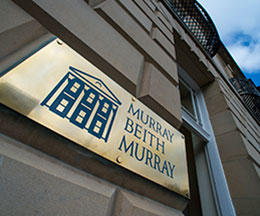Murray Beith Murray LLP is a leading Scottish private client law firm.
For 175 years we have specialised in meeting the legal, financial and administrative needs of individuals and families, family trusts, charities and private companies.
Murray Beith Murray LLP is a leading Scottish private client law firm.
For 175 years we have specialised in meeting the legal, financial and administrative needs of individuals and families, family trusts, charities and private companies.
 For many of us, leaving the family home to our children is something that is important to us. The question is, when is the best time to do this? Should you gift it to them now or leave it to them in your Will? Here, we explain what you should be considering when making this decision.
For many of us, leaving the family home to our children is something that is important to us. The question is, when is the best time to do this? Should you gift it to them now or leave it to them in your Will? Here, we explain what you should be considering when making this decision.
People often choose to gift their home to their children because they are keen to either reduce inheritance tax liability or to reduce the value of their assets to qualify for local authority care funding in later life. However, this is not as straightforward as it might seem.
For inheritance tax, a seven-year rule comes into play after gifting a house. This means, if you die within seven years of gifting the house, inheritance tax will still be payable, although the tax rate will decrease the bigger the gap is between the gifting and your death.
If you die within three years of gifting the property, the tax rate is 40% of anything above the threshold (currently at £325,000). Gifts made between three to 7 years, are taxed on a sliding scale known as ‘taper relief’.
|
Years between gift and death |
Tax Rate |
|
less than 3 |
40% |
|
3 to 4 |
32% |
|
4 to 5 |
24% |
|
5 to 6 |
16% |
|
6 to 7 |
8% |
|
7 or more |
0% |
The property will still be treated as forming part of your estate for inheritance tax purposes if you do not move out of the house after gifting it and continue to live in it without paying rent. In such a case, the gift would be caught by the gift with reservation of benefit anti-avoidance provisions. In order to gift your home effectively for inheritance tax purposes and continue living in it, you will have to show that you are paying rent at the market rate and paying your share of the bills.
The local authorities are also likely to consider such a gift to be a “deliberate deprivation of assets”. If the local authorities do make this determination, then the gifted home will be regarded as part of your assets and included in your assessment for funding for a care home.
Alternatively, you can leave the house to your children in your Will. If you go down this route, you need to be mindful of inheritance tax and when it applies.
As a starting point, there is no inheritance tax paid on the first £325,000 of your estate. This is known as the ‘nil-rate band’ and means that if your assets total £325,000 or less when you die, then there will be no inheritance tax due.
There is also an additional rule called the ‘main residence nil-rate band’. This provides an extra tax-free allowance of £175,000 on top of the £325,000 nil-rate band, provided that the house is being left to a direct descendent such as child, step-child, foster child, adopted child or grandchild. It does not apply if you want to leave the house to friends, nieces or nephews. If your total assets are worth more than £2m, this additional allowance will gradually decrease by £1 for every £2 over the threshold.
Taking the ‘nil rate band’ and ‘main residence nil-rate band’ together means that you have potentially £500,000 of property you can leave to your child tax-free. This can increase further as each of these allowances is per person, meaning that spouses or civil partners could potentially leave £1,000,000 of property on the death of the survivor of them to their children tax-free if the criteria is met.
The ‘main residence nil-rate band’ cannot be used with lifetime gifts.
Please note that his blog is commenting on inheritance tax only and not any other taxes.
If you found this Insight blog useful, you may be interested in other articles by Murray Beith Murray which you can find here.
If you have any questions about the issues covered here, or if you would like to discuss your Will or any Estate Planning matter with our lawyers, please call us on 0131 225 1200 or fill in our contact form.
We pride ourselves in providing attentive service that helps our clients to protect their assets throughout generations. We clearly outline the implications from initial contact, helping to dispel the mystery behind the law and legal process. We look forward to helping you.
